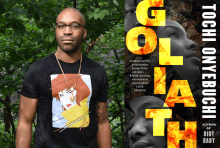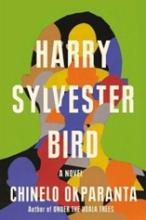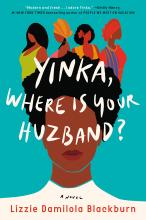English Matters’ latest reading recommendations include contemporary novels from the Nigerian Diaspora, of the popular-but-not-pulp variety. Ordered in what one might loosely call heavier to lighter reading, these books, we hope you’ll agree, are well-worth your time and attention. Enjoy.
Goliath, by Tochi Onyebuchi. Tochi Onyebuchi is a Nigerian-America Afrofuturist science fiction writer and civil rights lawyer, and his new novel Goliath wonderfully represents his favored genre. Plot synopsis sells the novel: white flight is literal – man-made environmental disasters have caused most of the wealthy (and mostly white) people on planet Earth to flee to space. BIPOC citizens are left behind to deal with the fallout. The space colonists eventually return, gawk, party hard, re-colonize, gentrify, and ultimately meet resistance. Brilliant, no? And even more, for the geekier English majors among us, Goliath incorporates not just straightforward narrative but various modes of writing, linear and non-linear. This complex form is layered with abundant biblical references and frameworks, apparent and subtle. As such, Goliath is a book that engages serious and casual readers alike, and stimulates thought and conversation.
Harry Sylvester Bird, by Chenelo Okparanta. Nigerian born Chinelo Okparanta moved to the United States at the age of ten. Now a professor in Swarthmore College’s English department, her second novel Harry Sylvester Bird follows over ten years the perspective of a young white man struggling with his identity. Traumatized by racist parents, a mentally instable Harry swerves strongly to white liberal antiracism, but then continues to topple over into “race reassignment.” The novel is largely a satirical social critique that reminds vaguely of Vonnegut in its direct style and dry picking at sore subjects. Perspective follows Harry, and through his eyes most other characters are flat “types.” Okparanta probably purposefully left this sort of openness in the novel, and so Harry Sylvester Bird is something of a Rorschach test, tending to draw a wide range of strong responses and interpretations about the deep roots of racism from readers depending on their imported outlooks and beliefs.
Yinka, Where Is Your Huzband? by Lizzie Damilola Blackburn. Yinka, Where is Your Huzband is a polarizing novel, largely because British-Nigerian protagonist Yinka is a bit of a trainwreck, and persistently so. Many readers and critics interpret Yinka as a sort of Black Bridget Jones. Maybe, but Yinka is a more serious person who undergoes less made-for-the-movies apparent growth. As a reader I expected Yinka’s feet to progressively come firmly underneath her as she develops into a fulfilling romance. But this common narrative arc is challenged and to some extent rejected – Yinka is ultimately less successful at dating than Bridget Jones, and she changes less than many readers might like. Nevertheless, she is an easy protagonist for whom to root, and Blackburn surrounds her with charismatic characters who are all too happy to heap upon Yinka’s wandering wallflower whatever advice and intrusion might occur to them. Yinka Where is Your Huzband? is largely about navigating identity between cultures and the tenacity of psychological character. It is a romcom that slyly undercuts the conventions of romcom.


